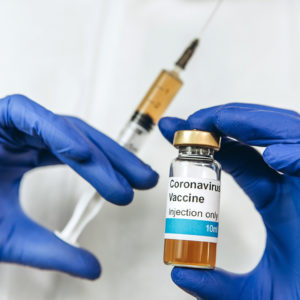New Hampshire’s official COVID-19 statistics continue to show the efficacy of vaccines in fighting infection, hospitalization and death from the ongoing pandemic. But this information is not included on the state’s COVID-19 dashboard, nor in the daily or weekly COVID press releases, hindering the state’s vaccine promotion efforts.
New Hampshire recorded its first breakthrough infection (a COVID-19 infection in a fully vaccinated patient) on January 20th of this year, the state Department of Health and Human Services reports. Since that date, only a small fraction of the state’s COVID-19 infections, hospitalizations, and deaths have occurred among fully vaccinated persons, according to data released to the Josiah Bartlett Center from the state Department of Health and Human Services.
From Jan. 20-Sept. 24, 2021:
- Only 3.5% of total COVID-19 infections (1,976 of 57,203) have occurred among fully vaccinated individuals;
- Only 6.4% of initial hospitalizations (37 of 579) have occurred among fully vaccinated individuals;*
- Only 6.5% of deaths from COVID-19 (28 of 430) have occurred among fully vaccinated individuals.
(*The state records COVID hospitalizations for those who were hospitalized upon the initial report of their infection. If someone is hospitalized after the initial report of infection, that would not be included in the hospitalization statistics. The state has always reported COVID hospitalizations this way.)
While state data show that 96.5% of New Hampshire’s COVID-19 infections, 93.6% of initial hospitalizations and 93.5% of deaths have occurred among unvaccinated individuals since January 20th, these statistics are created manually within the department and thus are not part of the daily or weekly information released to the public.
Making these statistics a regular part of the state’s vaccination message might help reduce vaccine hesitancy, polling suggests.
And higher vaccination rates would improve the state’s economic prospects while accelerating the end of the pandemic.
New Hampshire ranks 10th in the nation in the percentage of residents who are fully vaccinated (61%), according to the latest tracking data from Becker’s Hospital Review. Yet that percentage is well below all other New England states. The top five most vaccinated states are the five other New England states.
Vaccine hesitancy has slowed the state’s vaccination efforts. According to a University of New Hampshire poll released Sept. 21, the top two reasons unvaccinated Granite Staters gave for not wanting the vaccine were: 1. They don’t trust it will be safe; and 2. They don’t believe it’s effective.
Both of those fears run contrary to large amounts of publicly available data.
Regarding vaccine safety, the state could put more resources into promoting research that has shown the vaccines to be safe. A Harvard study of nearly 2 million Israelis, for example, found that not only were vaccine complications extremely rare, but conditions commonly associated with the vaccines — such as inflammation of the heart muscle — occurred more frequently in unvaccinated individuals who were infected with COVID than in individuals who received the vaccine.
Regarding vaccine effectiveness, the state should make the vaccination statistics listed above part of its daily COVID reporting, as well as part of any public information campaign.
Data highlighting the effectiveness of the vaccines should be put atop the state’s COVID-19 dashboard and should be made the focus of every press release and briefing.
People are getting a lot of bad information from unreliable sources. The state needs a more rigorous effort to counter misinformation with its own reliable data.
State officials are aware that the vaccination data would help combat myths about the vaccines, but the statistics were not built into the initial reporting system, and a general manpower shortage has delayed the state’s effort to add them, according to a spokesman for the state Department of Health and Human Services.
“We’re working on it, but it boils down to capacity,” HHS Director of Communications Jake Leon wrote in an email. “As you might imagine, we’re as busy as we’ve ever been but do not have as much access to temp staffing with the National Guard standing down.”
The public health reasons for publishing accurate information about the safety and efficacy of vaccines are obvious. There also are economic reasons.
COVID-19’s negative economic impact is widely known, and that impact continues to push down economic forecasts. The National Association for Business Economics this week cut its economic growth forecast, largely due to fears over the prolonged presence of COVID-19.
For those who want to see New Hampshire’s economy reach its maximum potential, a high vaccination rate for COVID-19 is vital. It’s hard to engage in free and open commerce when a potentially fatal communicable disease continues to suppress direct human interaction, reduce labor force participation and otherwise disrupt overall economic activity.





